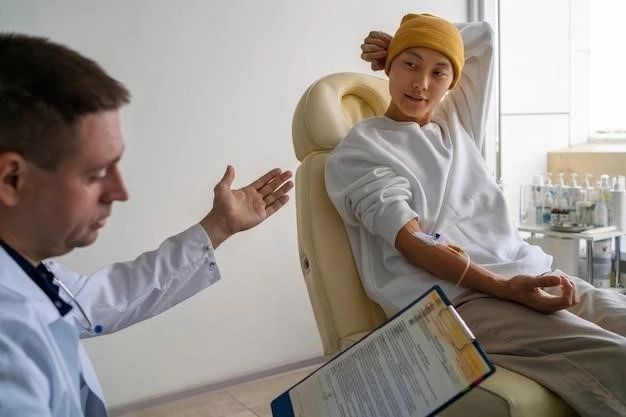Helmerhorst–Heaton–Crossen Syndrome
This article provides an overview of Helmerhorst–Heaton–Crossen syndrome, a rare genetic neurological disorder․ Detailed information will be presented on symptoms, diagnosis, treatment, current research, genetic counseling, support for patients and families, and the role of healthcare professionals․
Introduction
Helmerhorst–Heaton–Crossen syndrome is a rare genetic neurological disorder first described in 2003․ It is characterized by a range of symptoms that affect the nervous system․ This syndrome was named after the three patients in whom it was initially identified – Andrea L․ Helmerhorst, Adriaan W․ Heaton, and Madison E․ Crossen․
Understanding this syndrome is crucial for healthcare professionals, patients, and families as it impacts both physical and cognitive functions․ While the exact prevalence of this syndrome is unknown, its rarity makes it important to increase awareness and knowledge within the medical community․
This article aims to provide a comprehensive overview of Helmerhorst–Heaton–Crossen syndrome, discussing its symptoms, diagnosis, treatment options, current research efforts, genetic counseling implications, and the support available for individuals and families affected by this condition․ Healthcare professionals play a vital role in the management and care of patients with this syndrome, making their involvement essential․
Understanding the Condition
Helmerhorst–Heaton–Crossen syndrome is a complex genetic neurological disorder that presents a variety of challenges for patients and their families․ This syndrome is caused by specific genetic mutations that impact the normal function of the nervous system․
Individuals with this syndrome may experience a wide range of symptoms that can affect motor skills, cognitive abilities, and overall quality of life․ The severity and combination of symptoms can vary among affected individuals, making each case unique․
Research into the underlying genetic mechanisms of Helmerhorst–Heaton–Crossen syndrome is ongoing, with the goal of better understanding the condition and developing more effective treatment strategies․ This genetic component underscores the importance of genetic counseling for affected individuals and their families․
By gaining a deeper understanding of the complex interplay between genetics and neurological function in Helmerhorst–Heaton–Crossen syndrome, healthcare professionals can provide more targeted and personalized care to improve outcomes and quality of life for patients living with this rare disorder․
Rare Syndrome
Helmerhorst–Heaton–Crossen syndrome is categorized as a rare disorder due to its low prevalence in the general population․ The rarity of this syndrome poses challenges in terms of diagnosis, treatment, and access to specialized care for affected individuals․
Because of its rarity, healthcare professionals may have limited familiarity with Helmerhorst–Heaton–Crossen syndrome, which can lead to delays in diagnosis and management․ Increased awareness and understanding of rare syndromes like this are essential to ensure timely and appropriate care for those affected․
Research into rare syndromes is crucial for expanding our knowledge of these conditions, improving diagnostic methods, and developing targeted therapies․ Collaborative efforts among researchers, healthcare providers, and patient advocacy groups are key to advancing our understanding of rare disorders like Helmerhorst–Heaton–Crossen syndrome․
While rare syndromes present unique challenges, they also highlight the importance of individualized care and support for patients and families navigating the complexities of living with a rare genetic condition․ By recognizing the rare nature of Helmerhorst–Heaton–Crossen syndrome, we can better tailor care strategies to meet the specific needs of those affected by this condition․
Symptoms of the Syndrome
The symptoms of Helmerhorst–Heaton–Crossen syndrome can manifest in various ways, impacting different aspects of an individual’s health and well-being․ Common symptoms may include developmental delays, intellectual disabilities, speech and language impairments, seizures, problems with coordination and balance, and behavioral challenges․
Individuals with this syndrome may also experience sensory issues, such as hypersensitivity to sound, touch, or light․ Motor difficulties, including muscle weakness and tremors, can affect mobility and daily activities․ Cognitive challenges, such as learning difficulties and memory problems, are also commonly observed․
Additionally, individuals with Helmerhorst–Heaton–Crossen syndrome may exhibit social and emotional difficulties, such as anxiety, mood disorders, and difficulties in social interactions․ The combination and severity of symptoms can vary among affected individuals, highlighting the complex nature of this neurological disorder․
Understanding the diverse array of symptoms associated with Helmerhorst–Heaton–Crossen syndrome is crucial for healthcare professionals involved in the care and management of affected individuals․ By recognizing and addressing these symptoms comprehensively, healthcare teams can develop targeted treatment plans to enhance the quality of life for patients living with this syndrome․
Diagnosis Process
Diagnosing Helmerhorst–Heaton–Crossen syndrome involves a comprehensive approach that considers the individual’s medical history, physical examination, genetic testing, and neuroimaging studies․ Due to the rarity of this syndrome and the complexity of its symptoms, a multidisciplinary team of healthcare professionals is often involved in the diagnostic process․
Genetic testing plays a crucial role in confirming the diagnosis of Helmerhorst–Heaton–Crossen syndrome by identifying specific gene mutations associated with the disorder․ Additionally, neuroimaging studies, such as magnetic resonance imaging (MRI) and computed tomography (CT) scans, may be performed to assess any structural abnormalities in the brain․
Because the symptoms of this syndrome overlap with those of other neurological disorders, reaching an accurate diagnosis requires careful evaluation and collaboration among specialists, including geneticists, neurologists, pediatricians, and neuropsychologists․ Early and accurate diagnosis is essential to initiate appropriate treatment and support services for individuals with Helmerhorst–Heaton–Crossen syndrome․
Healthcare professionals involved in the diagnosis process must remain informed about the latest advancements in genetic testing and diagnostic techniques to ensure timely and accurate identification of rare genetic conditions like Helmerhorst–Heaton–Crossen syndrome․ By leveraging a combination of clinical expertise and cutting-edge diagnostic tools, healthcare teams can provide optimal care for individuals affected by this complex neurological disorder․
Treatment and Management

The treatment and management of Helmerhorst–Heaton–Crossen syndrome focus on addressing the specific symptoms and challenges faced by individuals with this rare genetic neurological disorder․ As there is currently no cure for the syndrome, treatment strategies primarily aim to improve quality of life, maximize functional abilities, and provide comprehensive support․
Medical interventions for Helmerhorst–Heaton–Crossen syndrome may include medications to manage seizures, behavioral therapies to address cognitive and emotional difficulties, and physical therapy to improve mobility and coordination․ Speech therapy and occupational therapy can help individuals enhance their communication skills and daily living activities․
Individualized treatment plans are essential for addressing the unique needs of each individual with Helmerhorst–Heaton–Crossen syndrome․ Healthcare professionals and specialists collaborate to develop holistic care plans that consider the multifaceted nature of the syndrome’s symptoms and their impact on the individual’s overall well-being․
In addition to medical interventions, ongoing monitoring and follow-up care are critical components of the management of Helmerhorst–Heaton–Crossen syndrome․ Regular assessments by healthcare providers help track the progression of symptoms, adjust treatment strategies as needed, and provide support to patients and their families throughout their healthcare journey․
By employing a multidisciplinary approach that encompasses medical, therapeutic, and supportive interventions, healthcare teams can enhance the quality of life and functional outcomes for individuals living with Helmerhorst–Heaton–Crossen syndrome․ Empowering patients with comprehensive care and customized management strategies is key to promoting their well-being and optimizing their health outcomes․
Current Research
Current research on Helmerhorst–Heaton–Crossen syndrome is focused on further understanding the underlying genetic mechanisms, exploring potential treatment options, and enhancing the quality of care for individuals affected by this rare genetic neurological disorder․ Ongoing studies aim to elucidate the specific gene mutations responsible for the syndrome and their impact on neurological function․
Genetic research plays a critical role in identifying new therapeutic targets and developing personalized treatment approaches tailored to the unique genetic profiles of individuals with Helmerhorst–Heaton–Crossen syndrome․ By unraveling the genetic complexities of the disorder, researchers strive to pave the way for more effective interventions and improved outcomes․
In addition to genetic studies, current research efforts also focus on investigating the neurological manifestations of the syndrome, studying potential biomarkers for early diagnosis, and exploring innovative therapeutic modalities to address the diverse symptoms associated with Helmerhorst–Heaton–Crossen syndrome․
Collaboration among researchers, healthcare professionals, advocacy groups, and affected individuals and families is essential for advancing our understanding of Helmerhorst–Heaton–Crossen syndrome and translating research findings into clinical practice․ By fostering interdisciplinary collaborations and sharing knowledge globally, the scientific community can drive progress in the diagnosis, treatment, and management of this rare genetic disorder․
Genetic Counseling
Genetic counseling plays a crucial role in the management of Helmerhorst–Heaton–Crossen syndrome by providing individuals, families, and caregivers with valuable information and support regarding the genetic aspects of the condition․ Genetic counselors help individuals understand the inheritance pattern of the syndrome, assess the risk of passing it on to future generations, and make informed decisions about family planning․
For individuals diagnosed with Helmerhorst–Heaton–Crossen syndrome, genetic counseling offers a supportive environment to discuss the implications of the genetic diagnosis, explore available testing options for family members, and navigate the complexities of genetic information․ Counselors provide emotional support, education, and resources to empower individuals and families in making informed healthcare decisions․
Genetic counseling also plays a preventive role by identifying at-risk individuals within families and offering guidance on genetic testing, screening recommendations, and reproductive options․ By promoting genetic awareness and informed decision-making, counselors help individuals proactively manage their genetic health and well-being․
Given the hereditary nature of Helmerhorst–Heaton–Crossen syndrome, genetic counseling is essential for empowering individuals to understand the genetic basis of the disorder, access appropriate medical care, and engage in personalized management strategies․ By facilitating open communication, education, and support, genetic counselors contribute to the holistic care and well-being of individuals and families affected by this rare genetic neurological condition․
Support for Patients and Families
Support for patients and families affected by Helmerhorst–Heaton–Crossen syndrome is crucial in navigating the challenges associated with this rare genetic neurological disorder․ Patient support networks, advocacy organizations, and healthcare professionals play a vital role in providing comprehensive care and assistance to individuals and families coping with the impacts of the syndrome․
Patient support groups offer a valuable platform for individuals living with Helmerhorst–Heaton–Crossen syndrome to connect with others facing similar experiences, share information, and access emotional support․ These groups foster a sense of community, understanding, and solidarity among individuals affected by the syndrome․
Advocacy organizations dedicated to raising awareness about rare genetic disorders like Helmerhorst–Heaton–Crossen syndrome advocate for improved access to healthcare services, educational resources, and research initiatives․ By amplifying the voices of affected individuals and families, these organizations drive positive change and promote greater support within the healthcare system․
Healthcare professionals, including genetic counselors, physicians, therapists, and social workers, play a critical role in offering tailored support, guidance, and resources to patients and families affected by Helmerhorst–Heaton–Crossen syndrome․ By providing comprehensive care, education, and advocacy, healthcare teams contribute to enhancing the quality of life and well-being of those living with this complex neurological condition․
Involvement of Healthcare Professionals
The involvement of healthcare professionals is integral to the care and management of individuals with Helmerhorst–Heaton–Crossen syndrome, a rare genetic neurological disorder․ A multidisciplinary approach that includes geneticists, neurologists, pediatricians, psychologists, therapists, and other specialists is essential in providing comprehensive and coordinated care to address the diverse needs of patients․
Geneticists play a key role in diagnosing and interpreting the genetic components of Helmerhorst–Heaton–Crossen syndrome, providing valuable insights into the inheritance patterns and implications for affected individuals and their families․ Collaboration with neurologists helps in managing the neurological aspects of the syndrome and developing personalized treatment strategies tailored to each patient’s specific symptoms and challenges․
Pediatricians are instrumental in overseeing the overall health and development of children with Helmerhorst–Heaton–Crossen syndrome, monitoring growth, nutritional needs, and developmental milestones․ Psychologists and therapists offer essential support in addressing the cognitive, emotional, and behavioral aspects of the syndrome, fostering mental well-being and enhancing coping strategies․
Healthcare professionals also play a critical role in facilitating access to support services, community resources, and specialized care for individuals and families affected by Helmerhorst–Heaton–Crossen syndrome․ By collaborating closely, sharing expertise, and staying informed about the latest research and advancements in the field, healthcare teams can optimize treatment outcomes and improve the overall quality of life for patients living with this rare genetic disorder․
